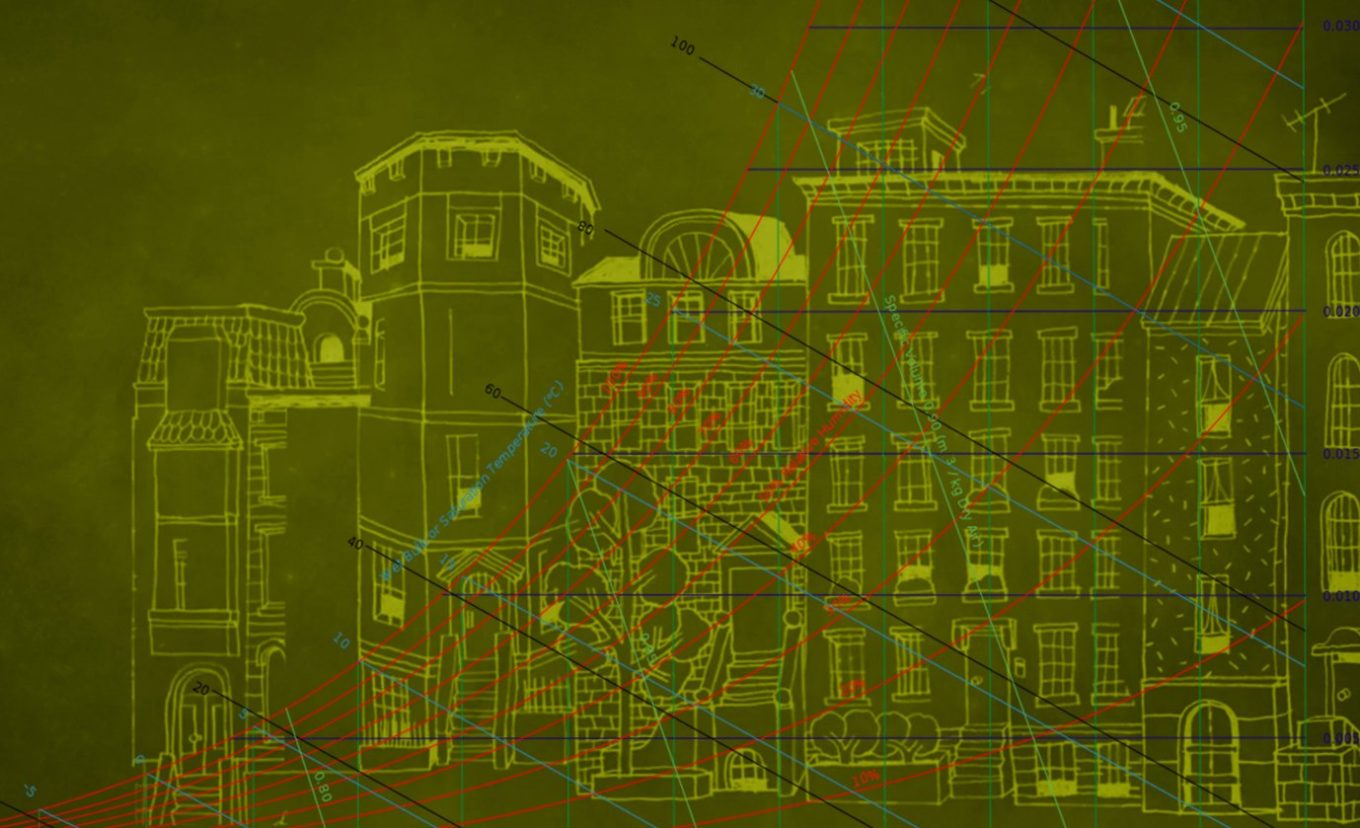
We tend to look at economics and business as dead concepts. As rational subjects, that are governed by strict parameters such as growth, supply and demand, GDP, externalities… But economics is not dead at all. It is actually something quite vital, that runs our lives and impacts them in a profound way. Economics is alive, and we are all part of it. We are doing it with our actions and choices every single day. If we want to, we can change the system, through concerted action, and transform it into an economics with a heart.
Unfortunately, we live now strange times. Most of us are quite discouraged with the current economic system governing our lives. We are now dealing with increasing levels of inequality (also explained due to stagnant wages), impending automation that might lead to widespread job loss, and profound environmental problems that we are not able to deny anymore. If we look at the root of the current crisis we are facing, we will see that it is also shaped by an economic mindset based in scarcity thinking and resulting from collective consciousness influenced by the less evolved, survival oriented reptilian brain.
It seems that urgent change is needed if we truly aspire to transform the planet.
“When everything is subject to money, then the scarcity of money makes everything scarce, including the basis of human life and happiness. Such is the life of the slave. Perhaps the deepest indication of our slavery is the monetization of time.” Charles Eisenstein
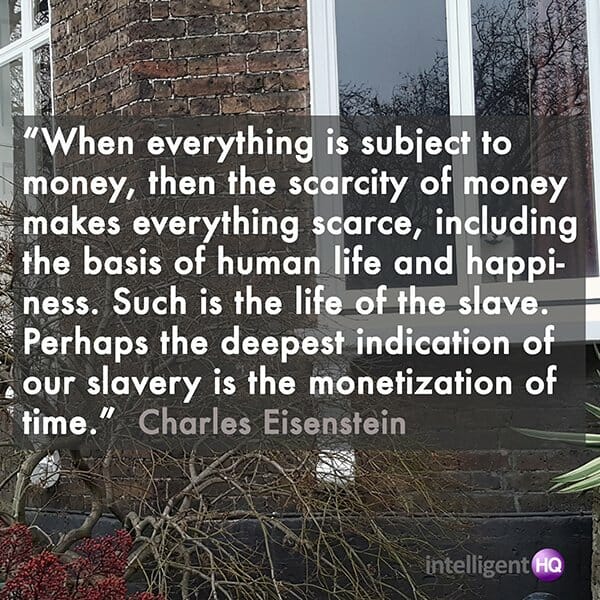
Economics as Something Alive
A simple and radical way, to think about this from a novel standpoint, which moves away from the survival mindset, is if we look at economics as something alive, and in the making. Something that is not separate from us, but that is part of us and that we can change.
Charles Eisenstein, is a speaker, thinker and author, that has investigated in a series of articles, books and talks a new kind of economics that relates to itself from a totally novel standpoint, through what he calls a story of reunion.
I came across the work of Charles Eisenstein, almost a decade ago and was struck and excited by the possibilities he was offering. Charles opened doors, because of the way he uses language.
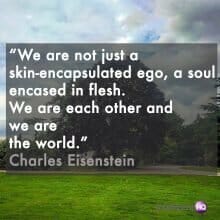
“Why does the sun shine?” writes Charles Eisenstein recently in his website … And he continues “A random result of coalescing gases igniting nuclear fusion? Or is it in order to give its light and warmth to Life? Why does the rain fall? Is it the senseless product of blind chemical processes of evaporation and condensation? Or is it to water life? Why do you seek to pour forth your song? Is it to show off your genetic fitness to attract a mate, or is it to contribute to a more beautiful world? “
In this paragraph, we have a picture of what kind of shift is requested from us to understand and feel things in a different way.
If scientific and rational conceptualisations have their place, particularly when explaining the fragment and/or physical processes, one needs to take one step beyond rational explanations, when moving to an understanding that economics is alive, and we are all part of it, participating in its dynamic processes.
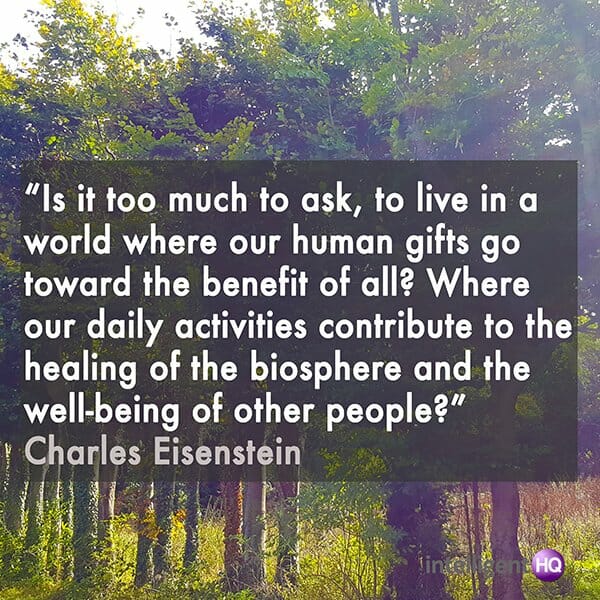
Just that shift in language, truly felt, not only conceptually but in the emotions and sensations in our body, would be enough to awaken in humans the desire to search for solutions more fit to solve the current crisis we face in the world. To start designing what one could call an economics with an heart.
Charles wrote various books, such as “The More Beautiful World Our Hearts Know is Possible”, “Climate—A New Story”, “Sacred Economics” and others.
Charles fresh and unique voice and view points, led the publishers’ Weekly to state that he “will be noted in antiquity as one of the seminal and pioneering storytellers of this new world.”
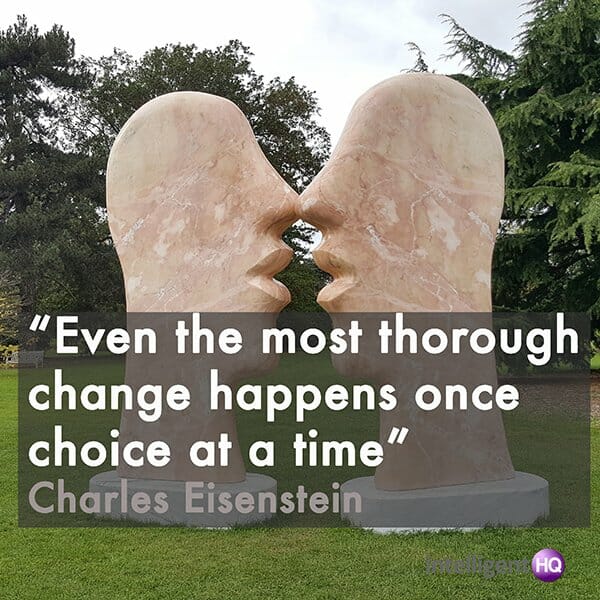

Maria Fonseca is the Editor and Infographic Artist for IntelligentHQ. She is also a thought leader writing about social innovation, sharing economy, social business, and the commons. Aside her work for IntelligentHQ, Maria Fonseca is a visual artist and filmmaker that has exhibited widely in international events such as Manifesta 5, Sao Paulo Biennial, Photo Espana, Moderna Museet in Stockholm, Joshibi University and many others. She concluded her PhD on essayistic filmmaking , taken at University of Westminster in London and is preparing her post doc that will explore the links between creativity and the sharing economy.























